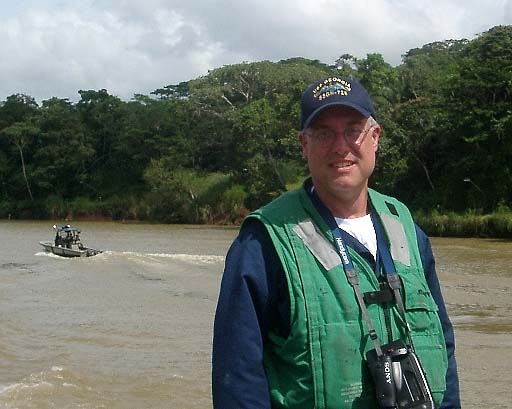Reporting from Beirut and Nairobi, Kenya -- In their most brazen raid yet, suspected Somali pirates operating deep in open waters have seized an oil tanker as long as an aircraft carrier, the U.S. military in the Middle East said Monday.Global fecklessness is still (ironically) strong. Iranian grain ship seized as Somali pirates hold world to ransom
So audacious and unusual was the Indian Ocean attack that it caught the attention of America's top military official, who expressed shock at the pirates' ability to strike so far from shore.
Somali pirates struck again yesterday, seizing an Iranian cargo ship holding 30,000 tonnes of grain, as the world’s governments and navies pronounced themselves powerless against this new threat to global trade.Of course a political solution is required. The lack of a functioning government in Somalia allows for the existence of safe havens ashore for pirates. These must be taken away from them. Whatever exists of a government in Somalia must be made to agree.
Admiral Michael Mullen, the US military chief, pronounced himself stunned by the pirates’ reach after their capture of the supertanker Sirius Star and its $100 million (£70 million) cargo. Commanders from the US Fifth Fleet and from Nato warships in the area said that they would not intervene to retake the vessel.
The Foreign Minister of Saudi Arabia, the owner of the ship, condemned the hijacking as an “outrageous act” that required international action.
“Piracy, like terrorism, is a disease which is against everybody, and everybody must address it together,” Prince Saud al-Faisal said. Arab diplomats would meet in Cairo on Thursday to discuss what could be done in response, Yemeni officials said.
Analysts said, however, that the seizure of the Sirius Star exposed the use of foreign warships as “a sticking plaster” that would not solve the problem. “Maritime security operations in that area are addressing the symptoms not the causes,” said Jason Alderwick, a maritime defence analyst at the International Institute for Strategic Studies.
Roger Middleton, a Horn of Africa specialist at the Chatham House think-tank, said that the capture was a crucial escalation. “Now that they have shown they are able to seize an enormous ship like this, it is beyond a military solution. You won’t fix this without a political solution.”
Lawhawk over at A Blog For All discusses the solution.
These countries aren't powerless to act. They are abdicating their responsibility to act. These pirates are indeed terrorists, and there is some indication that they are perhaps middlemen for al Qaeda or other terrorist outfits.Go and read his entire post. he has gotten it exactly right.
That would fit with my contention that the failure to deal decisively with failed states and the situation in Somalia in particular is resulting a security nightmare.
The solution is to go after the pirates and stop treating this solely as a law enforcement action. The UN Treaty on the Seas has failed to dent the problems facing worldwide commerce as a result of the ongoing piracy. Articles 100 and following deal with what governments can and should do, and yet they are doing nothing of the kind.
In other words, if the US captures pirates and their ships, US law would apply. Similarly, if the Royal Navy captures the pirates, British law applies. Yet, as the Times Online article notes, the British government passed on the men it captured to the Kenyans for prosecution.Pirates, when captured, should never again see the light of day.
These pirates are lucky they were not killed while engaged in their acts of violence on the high seas. For the rest of us, we're watching as the justice system grinds its wheels slowly and can't even begin to figure out how to deal with the problem in an effective manner.
Kill.Them.All.






No comments:
Post a Comment